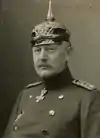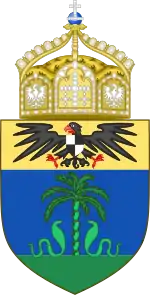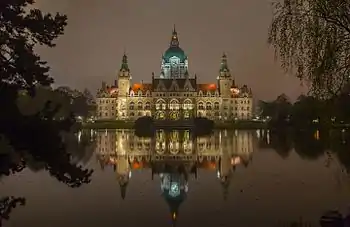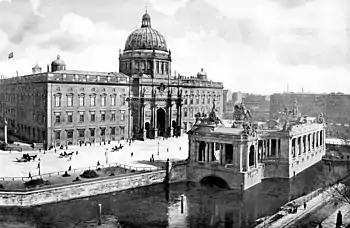German Empire

.svg.png.webp)
The German Empire (German: Deutsches Kaiserreich, officially Deutsches Reich), was the German nation state that existed from the Unification of Germany in 1871 until the abdication of Kaiser Wilhelm II in 1918.
The German Empire consisted of 26 states, most of them ruled by noble families. They included four kingdoms, six grand duchies, five duchies (six before 1876), seven principalities, three free Hanseatic cities, and one imperial territory. Although Prussia was one of several kingdoms in the realm, it contained about two thirds of Germany's population and territory.
After 1850, the states of Germany had rapidly become industrialized, with particular strengths in coal, iron (and later steel), chemicals, and railways. In 1871, Germany had a population of 41 million people; by 1913, this had increased to 68 million. A heavily rural collection of states in 1815, the now united Germany became predominantly urban. During its 47 years of existence, the German Empire was an industrial, technological, and scientific giant, gaining more Nobel Prizes in science than any other country.
Selected article

The German colonial empire (German: Deutsches Kolonialreich) constituted the overseas colonies, dependencies and territories of Imperial Germany. Short-lived attempts of colonization by individual German states had occurred in preceding centuries, but crucial colonial efforts only began in 1884 with the Scramble for Africa. Germany lost control when World War I began in 1914 and its colonies were seized by its enemies in the first weeks of the war. However some military units held out for a while longer: German South-West Africa surrendered in 1915, Kamerun in 1916 and German East Africa only in 1918 by end of the war. Germany's colonial empire was officially confiscated with the Treaty of Versailles after her defeat in the war and the various units became League of Nations mandates under the supervision (but not ownership) of one of the victorious powers.
Until their 1871 unification, the German states had not concentrated on the development of a navy, and this essentially had precluded German participation in earlier imperialist scrambles for remote colonial territory – the so-called "place in the sun". Germany seemed destined to play catch-up. The German states prior to 1870 had retained separate political structures and goals, and German foreign policy up to and including the age of Otto von Bismarck concentrated on resolving the "German question" in Europe and securing German interests on the continent.
Selected biography

Helmuth von Moltke (German pronunciation: [ˈhɛlmuːt fɔn ˈmɔltkə]; 23 May 1848 – 17 June 1916), also known as Moltke the Younger served as the Chief of the German General Staff from 1906 to 1914. The two are often differentiated as Moltke the Elder and Moltke the Younger.
Helmuth von Moltke was born in Biendorf, Grand Duchy of Mecklenburg-Schwerin. Moltke served with the 7th Grenadier Regiment and was cited for bravery. He attended the War Academy between 1875 and 1878 and joined the General Staff in 1880. In 1882 he became personal adjutant to his uncle, who was then Chief of the General Staff. In 1891, on the death of his uncle, Moltke became aide-de-camp to Kaiser Wilhem II, thus becoming part of the Emperor's inner circle.
Selected images
Did you know?

- ...that the DFB (Deutscher Fußball-Bund) was founded on 28 January 1900 in Leipzig by representatives of 86 clubs? The German national team played its first game in 1908.
- ...that Pickelhauben were popular targets for Allied souvenir hunters during the early months of the war? The spiked helmet remained part of a clichéd mental picture of Imperial Germany as late as the inter-war period even after the actual headdress had ceased to be worn.
Subcategories
Clicking the ► sign will expand or collapse the respective category.
Topics
States of the German Empire
_Hamburg.svg.png.webp)
Kingdoms
Grand Duchies
- Grand Duchy of Baden
- Grand Duchy of Hesse
- Grand Duchy of Mecklenburg-Schwerin
- Grand Duchy of Saxe-Weimar-Eisenach
- Grand Duchy of Mecklenburg-Strelitz
- Grand Duchy of Oldenburg
Duchies
- Duchy of Brunswick
- Duchy of Saxe-Altenburg
- Duchy of Saxe-Meiningen
- Duchy of Saxe-Coburg and Gotha
- Duchy of Anhalt
- Duchy of Saxe-Lauenburg
Principalities
- Principality of Schwarzburg-Sondershausen
- Principality of Schwarzburg-Rudolstadt
- Principality of Waldeck-Pyrmont
- Principality of Reuss-Greiz
- Principality of Reuss-Gera
- Principality of Schaumburg-Lippe
- Principality of Lippe
Free and Hanseatic Cities
- Free and Hanseatic City of Lübeck
- Free and Hanseatic City of Bremen
- Free and Hanseatic City of Hamburg
Imperial Territories
Colonies of the German Empire
The German colonial empire (German: Deutsches Kolonialreich) constituted the overseas colonies, dependencies and territories of Imperial Germany. Short-lived attempts of colonization by individual German states had occurred in preceding centuries, but crucial colonial efforts only began in 1884 with the Scramble for Africa. Germany lost control when World War I began in 1914 and its colonies were seized by its enemies in the first weeks of the war. However some military units held out for a while longer: German South-West Africa surrendered in 1915, Kamerun in 1916 and German East Africa only in 1918 by end of the war. Germany's colonial empire was officially confiscated with the Treaty of Versailles after Germany's defeat in the war and the various units became League of Nations mandates under the supervision (but not ownership) of one of the victorious powers.
 |
 |
 |
 |
 |
 | |
| German New Guinea | German Samoa | German South-West Africa | Kamerun | Togoland | German East Africa |
Associated Wikimedia
The following Wikimedia Foundation sister projects provide more on this subject:
-
 Commons
Commons
Free media repository -
 Wikibooks
Wikibooks
Free textbooks and manuals -
 Wikidata
Wikidata
Free knowledge base -
 Wikinews
Wikinews
Free-content news -
 Wikiquote
Wikiquote
Collection of quotations -
 Wikisource
Wikisource
Free-content library -
 Wikiversity
Wikiversity
Free learning tools -
 Wiktionary
Wiktionary
Dictionary and thesaurus
-
 List of all portals
List of all portals -

-

-

-

-

-

-

-

-

-
 Random portal
Random portal -
 WikiProject Portals
WikiProject Portals

.jpg.webp)

.jpg.webp)




.jpg.webp)

-en.png.webp)